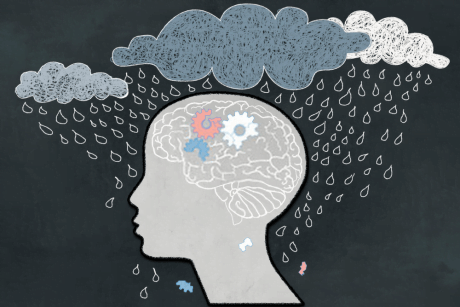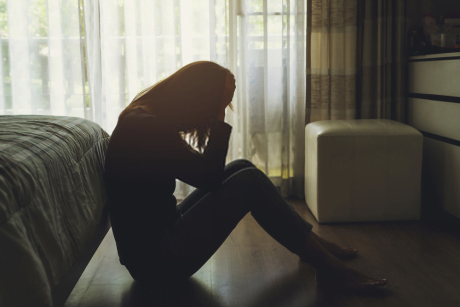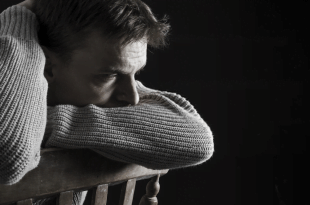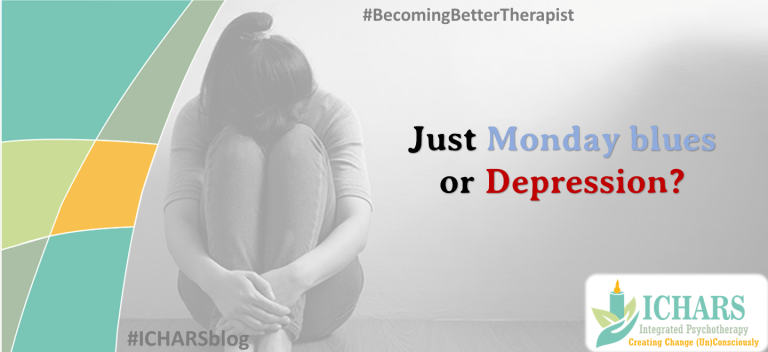4.5% of our population, that is, 56,675,969 Indians suffer from depression according to a 2015 report of World Health Organization. As per the 2017 Times of India article, around 10.6 lakh more anti-depressant medications were signed out in 2016 as compared to 2015. In fact, the obvious presence of this often misunderstood and understated disorder has been so strongly felt across the world in the recent times that the 2017 World Health Day theme was—Depression: Let’s talk!
Introduction to Depression

Depression is a mood disorder. All of us seem to have our blue days.
- It may be a lousy Monday morning to work (which you don’t really like to do) after a happening weekend when you partied hard or
- Simply when your car broke down on the day you had a super important meeting to attend or
- An assignment to turn in which when you failed to do, you got a good firing from your superior.
Sometimes, however, the emotional disturbance that people experience goes beyond the ordinary limits of severity and may in fact become pervasive over time. This is when one can be diagnosed as suffering from a psychological mood disorder. Mood disorders are of two types: depressive disorders and bipolar disorder. Here, we shall focus on the former kind.
What is Depression?
A depressive disorder is the one in which an individual experiences an unusually intense sad mood known as dysphoria.
Some alternative diagnostic labels that fall under the umbrella term of depressive disorders and are assigned according to the specific symptoms shown are: major depressive disorder, seasonal affective disorder, dysthymia, disruptive mood dysregulation disorder and premenstrual dysphoric disorder.
- According to the Diagnostic and Statistical Manual, a person is diagnosed as suffering from major depressive disorder or as being clinically depressed when s/he undergoes acute but time limited periods of what we call major depressive episodes. During this phase, that must last for most of the time in a two week period, the depressed individual exhibits intense physical and psychological symptoms like:
- Unrealistic sadness and feelings of worthlessness, inappropriate guilt
- Disinterest in pleasurable activities and daily routine
- Unaccounted weight loss or disturbed appetite
- Too much or too less sleep, nightmares
- Constant fatigue
- Difficulty in concentrating or making decisions
- Suicide ideation, plans or attempts
While checking for the presence of these symptoms, one must make sure that they aren’t attributable to any other medical or mental disorder or substance abuse.Also, one must ensure that the symptoms are causing significant distress and impairment to the host.
- When a circumscribed set of these symptoms are present to a lesser degree but for a chronic period of time (at least for 2 years in adults), the diagnosis assigned is called dysthymia.
- Seasonal affective disorder, which is more common in the cold countries, can be described as depression that hits in the winter months when in such countries as the US and Canada, the exposure to sunlight is very low which in turn disrupts bodily cycles by affecting the production of certain hormones.
- Disruptive mood dysregulation disorder is a diagnostic category specifically assigned to extremely irritable children who show frequent temper outbursts that originate well before the age of 10.
- Lastly, premenstrual dysphoric disorder is a relatively new and rather disputed diagnosis that is assigned to women who experience depressed mood, irritability and anxiety in the premenstrual period that subsides once the period commences for almost all cycles in the preceding year.
There have been arguments that such a diagnosis would pathologize the normal monthly mood variations women experience but there is quite a lot of research supporting the idea that such exaggerated emotional disturbances are not found in all women.
Why does depression occur?

Depression like most other psychological disorders is a mix of biological, psychological and social factors. In a lot of cases, depression is said to have a genetic base.
Apart from some abnormalities in brain regions which could contribute to this disorder, there are some other vulnerabilities that might expose one to an increased risk of developing depression.
Research has shown that women are 70% more likely than men to become depressed. One could explain this line of finding by referring to the cognitive styles and social setup that change the deal for the two genders.
- Depressed individuals, in general, are more likely to adopt a ruminative style of thinking about their situation, rather than taking some concrete action to bring about an improvement. Very often they make mistaken attributions and engage in over-generalisations and self blaming.
- Poverty, financial crunch, separation from one’s kin, divorce, accidents, physical or sexual assault, discrimination or early childhood trauma are some other agents that can be recognised and risk factors.
- One trigger that often goes unnoticed and rather results in sorry circumstances due to poor care and attention is depression that stems from being terminally ill.
- Sadness, grief, mourning, self pity, loss of spiritual touch and frustration can also act as triggers leading to depression.
Curious case of High Functioning Depression
Rohan is a well qualified professional, working in a firm. He is disciplined and quite successful in his job. He is very cordial with his colleagues. Everyone in the office likes him and appreciates him. He can be often seen having a great time with his friends. Not only with friends, but he also spends quality time with his family. Rohan seems to be one among those people who are perfect in every sense.
Even in your wildest dreams would you ever think that perfect Rohan is suffering from high functioning depression?
Perfect Rohan has to pull himself out of bed every morning and drag himself to work. He thinks he is good for nothing and a complete failure. He always used to doubt whether he had chosen the right career for himself. It used to be a difficult task for him to make himself get out of the house to meet and mingle with his friends and family.
It was difficult for both Rohan and others to understand or detect that he is suffering from high functioning depression.
Though the symptoms of high functioning depression may look similar to those of depression but the major difference is that a person with high functioning depression will appear normal and not depressed at all.
We would not even be able to make out if he/she has depression in spite of the fact that the person at that time may be struggling with so many things at an emotional level. This makes it more difficult to detect if he/she has high functioning depression and hence they often don’t get the required treatment.
This was also the case of our super cop Himanshu Roy. He was the former chief of Maharashtra Anti Terrorism Squad and played an important role in the investigations of 2013 IPL scandal, journalist J. Dey’s murder, Bollywood actor Laila Khan’s murder among many others. This IPS officer, often described as passionate towards his work, personal life and physical fitness, shot himself in the skull, leaving behind a suicide note describing how his cancer left his feeling depressed and frustrated enough to take this extreme step.
Depression and Suicide
Yes, depression may quench the will to live. And what is surprising is that a depressed individual doesn’t commit suicide when s/he is depressed because at that time they lack the energy to do it.
Rather, they complete the deed when they are getting better for the fear of falling back in that dark hole again is quite overwhelming.
Thus, social support, acceptance and treatment are important to prevent such a situation. It is important to acknowledge mental health as a part of wholesome living.
Tips to deal with depression: Self Care
- Exercise
Exercise helps you to deal with depression by releasing chemicals like endorphins which triggers a positive feeling in the body like morphine.Another advantage of exercising is that it will make you physically tired which will allow you to sleep better at night. - Proper eating habits It is important to remember that different food items can have different impact on your mood.For example, foods like Banana, Orange, Walnut, Dark Chocolate etc. can
have an uplifting effect on your mood. Hence, it is a good idea to include them as a part of your
diet. - Meditation
Different kinds of meditation can help to meet different goals.If you are in depression then we would highly recommend doing an external focus of attention meditation. Any mindfulness meditation where you are mindful about sensation on your body or what’s happening outside you can be extremely useful. It is also important to remember that during depression one must avoid internal focus of attention meditations like thought based meditation. If in doubt please consult a mental health practitioner. - Maintain a journal
Depression often maybe a result of pent-up emotions which might have been suppressed.So, when you start maintaining a journal and write what you are experiencing, the writing can provide you an outlet for these suppressed emotions. This can help you feel lighter in your mind and in your body. - Plan your daily activities Set goals for your daily activities and try to achieve them. Achieving them will help you boost your confidence.Spend a little more time on activities that you enjoy doing.
- Visit a mental health practitioner A mental health practitioner will help you deal with depression by helping you identify deeper issues that may have led to depression. You can also learn different ways to help you change your thoughts, emotions and behaviours.
Therapists Niche:

Very Important:
Since depression has a brain chemical imbalance component, any treatment for the same must be led by a trained psychiatrist. Being a recurrent illness, long-term continuous preventive treatment is strongly recommended and almost always indicated. A strategy that combines medication and psycho-therapeutic treatment is optimal for managing the disorder over time.
Cognitive Behaviour Therapy for Depression
Cognitive behaviour therapy which involves the use of techniques like modelling, positive reinforcement, thought restructuring and role playing, often on being combined with antidepressant medications as and when necessary, can help uplift people out of their depressive mood and dismantled state.
Hypnotherapy for Depression
- Hypnotic Suggestions can be used to build positive expectancy regarding treatment. Hypnosis in therapy can also help address and deal with numerous symptoms of depression (including but not limited to insomnia and rumination).
- It can help modify patterns of self-organisation (such as cognitive, response, attentional, and perceptual styles) that contribute to depressed thinking and mood.It can also help in retrieval of past positive experiences and the development of coping skills.
- Hypnosis can also be used to identify and address deeper issues (like past experiences and beliefs) that could have led to depression in the client. Another area where hypnosis can be extremely useful is catharsis. Hypnotic processes can not just help the client release stored negative emotions but also effectively replace them with positive emotions.
- Many a times for sustainable resolution of depression, the client needs to create certain lifestyle changes Hypnotic suggestions can help in creating these changes in a more natural and relatively automatic manner.
Important note
While using hypnosis in treatment of depression, when the symptoms are at its peak, it is very important to avoid processes that aim to identify and address deeper issues as this could lead to worsening of symptoms.
It is a good idea to work with the symptoms in the initial phase and once most of the symptoms have been addressed to an extent that the client is living a relatively functional life, deeper issues can be identified and addressed so as to minimize the chances of relapse.
In our experience, from the point of view of psychotherapy, an approach that integrates cognitive therapy with hypnosis, mindfulness and psycho-dynamic approaches for treatment of depression seems to be very effective both in short term management of symptoms and long term resolutions of deeper issues.
If you would like to learn more about using an eclectic approach that integrates these approaches effectively, do check out our comprehensive course in Cognitive Hypnotic Psychotherapy™.

